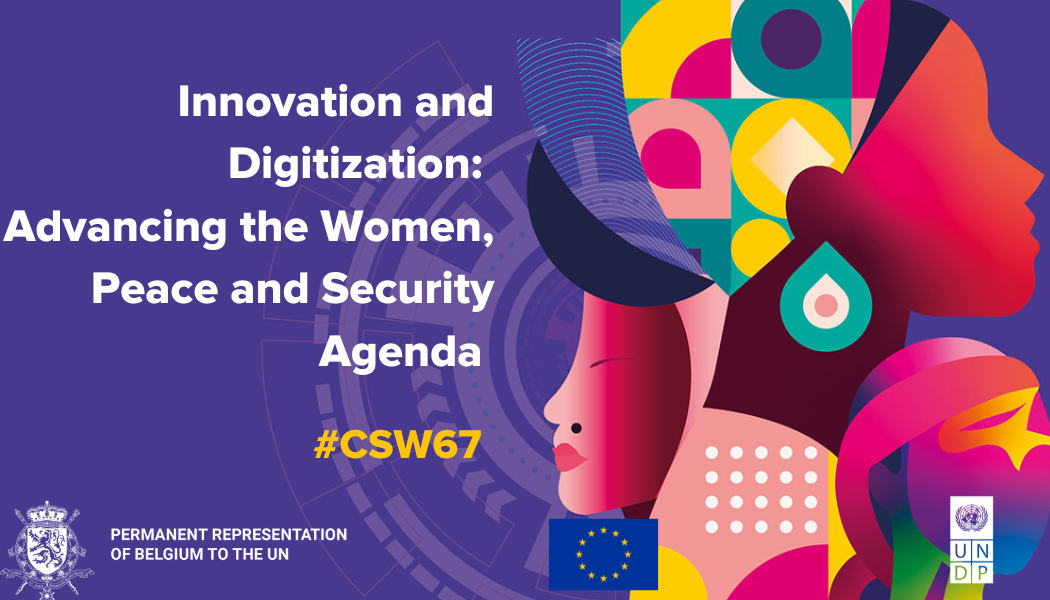Opening Remarks at Side Event to 67th session of the Commission on the Status of Women
Catalyst for Better Recovery and Resilience: Innovation and Digitization to Advance the Women, Peace and Security Agenda
March 14, 2023

If used correctly, digitalization can help enhance transparency and accountability, can help open services, amplify marginalized voices, and disrupt entrenched systems of power and patriarchy.
Excellencies, distinguished guests, ladies and gentlemen,
On the occasion of the 67th Commission on the Status of Women and against its theme of the year, it is my great pleasure to welcome you all for our event which explores challenges and opportunities of innovation and digitalization to advance the Women, Peace and Security Agenda.
Allow me to first thank our organizing partner and host, the Belgian Mission, along with our distinguished panelists for facilitating this important discussion.
We are now farther from achieving the goals of the Women, Peace and Security Agenda than ever before.
In crisis contexts, threats to women and girls are spreading faster and becoming more insidious.
Digital tools are being used to fuel a system of exclusion and disinformation.
We often see violent extremist groups using digital tools to profit from the subjugation of women and weaponize women’s desire to seek empowerment.
But today’s discussion is about turning this around.
We know that if used correctly, digitalization can help enhance transparency and accountability, can help open services, amplify marginalized voices, and disrupt entrenched systems of power and patriarchy.
Last year UNDP launched the 10 Point Action Agenda on Gender in Crisis as part of our Crisis Offer, a framework for development solutions in crisis and fragility. In it, our commitment to deliver on the Women Peace and Security Agenda takes center stage. The 10 actions in the Agenda are based on our acute recognition that continued threats to women and other marginalized groups require cohesive interventions across various interconnected areas to address the deepest sources of patriarchal norms and institutions.
We must seize the opportunities that crisis settings present, to reset systems, change mindsets and deliver sustained progress, rather than giving in to enormous challenges they also present.
To address the root causes of inequality and disrupt the status quo, we must be more intentional in embracing innovation and technology such as digitalization, new financing, and science-based approaches to behavior change.
Our work begins where threats and disparities are severest.
In Afghanistan, women are continuously expelled from the public sphere. Like our Afghan guest speaker who will speak about her work in coding shortly, we don’t give in.
UNDP, in our ABADEI programme, also continues to work with hundreds of Afghan women led businesses and enterprises to institute 200 women only market days in 3 provinces (Herat, Farah, Badghis) to reach 23,400 direct beneficiaries.
In Somalia, UNDP supports the HANO Academy in advancing STEM. We will hear more about the Sisters STEM Initiative from our panelist shortly.
In the same country, UNDP also introduced a methodology of behavioral science called Non-Violent Communication to address persistent issues related to gender justice. Through this approach, traditional leaders and women enhanced their capacity for empathetic connections in issues such as child marriage, female genital mutilation, and other discriminatory practices. For the first time, in the targeted communities, the cases decreased.
In Lebanon and Iraq, economic empowerment initiatives combined with responses to gender-based violence have provided safety at home and in the workplace. The use of behavioural science helped address power imbalances and created new avenues to employment, increasing female workforce retention by 40 percent.
In Yemen UNDP has worked with women and youth to train, develop and manage solar micro-grid businesses to help electrify their communities near war zones. Rural women launching technology-related business is remarkably rare and their new disposable income has given them a voice in community decision making.
Also in the panel shortly, you will hear from UNDP’s Communications Coordinator for Preventing Violent Extremism (PVE) in Bangkok. Through our ExtremeLives project, UNDP has designed a digital advocacy platform using the power of personal testimonies to aggregate data and develop models for broader system change.
These initiatives are proving to be very effective and promising. However, I must say that in our own work across crisis settings, we still have a long way to go.
These encouraging efforts must be scaled and blended with more transformational approaches that drives necessary normative changes that advance women’s informed participation across decision-making platforms.
Distinguished participants,
So far, the digital age has led to an age of disruption – with unequal results. We must ensure digitalization does not become yet another tool for advancing inequalities.
It will take broader partnerships, innovative thinking, and above all, shared political will to address power imbalances.
We can do this by ensuring digital strategies and WPS National Actions Plans are interlinked to eliminate barriers and reflect priorities for women and girls.
By gender differentiating our current and future engagements involving technology and innovation.
By placing marginalized voices at the center of technological developments.
Let us focus our efforts in the months and years to come, not on piecemeal approaches but on truly harnessing innovation and digitalization for transformative, joined-up action aimed at the most pervasive sources of inequality.
Thank you.

 Locations
Locations